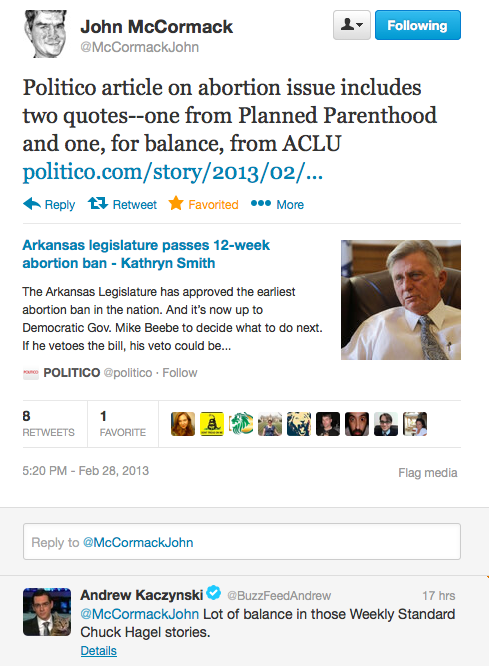Today is Washington Post ombudsman Patrick Pexton's last day. You can read his memo to staff here. To mark it, I'm ruminating on a Twitter exchange I happened across last night. So telling. It begins with John McCormack, a reporter for The Weekly Standard, writing:
Politico article on abortion issue includes two quotes--one from Planned Parenthood and one, for balance, from ACLU
It's a particularly bad example of what we see on abortion coverage every day, as well as coverage of many other hot-button issues commonly found on beats linked to religion and politics. Even though this is only six paragraphs long, it's a bad example.
But what I found interesting was the response from Andrew Kaczynski, a reporter for the supposedly mainstream Buzzfeed:
Lot of balance in those Weekly Standard Chuck Hagel stories.
This is a reference to The Weekly Standard's work opposing the nomination of Chuck Hagel to be Secretary of Defense. But the Standard (where my better half works) is an avowedly conservative opinion journal. It's whole purpose is to spread adoption of a particular set of conservative values.
Do you see the problem here?
BuzzFeed and Politico (and the Washington Post, and countless other media outlets) present themselves as mainstream media outlets doing straight news. I'll let Twitter do my work for me:
@QuinHillyer Weekly Standard is an opinion journal. Politico claims to be straight news. Big difference in what's expected
@McCormackJohn Well, at least they're more balanced than Buzzfeed's articles on gay marriage. Also: We don't pretend we're not ideological.
@IMAO_ He's very clearly saying that Politico is as partisan as the Weekly Standard.
We've been talking about this a lot recently, because it's a major change in the stated objectives of mainstream media. This is also a topic closely linked to media-bias studies about religion news.
These outlets still claim to be doing news reporting in some sectors, but they are now becoming much more honest about their extreme partisanship and lack of objectivity and fairness on other issues. I can put it no better than tmatt already has:
When it comes to the daily news, the recently retired editor of The New York Times has decided there is news and then there is news about religion and social issues.
The honesty coming from all quarters is refreshing, but it is also challenging. When outlets that used to present themselves as performing straight news admit they run press releases for the causes they're piously devoted to, we may need a new paradigm for understanding the service they're providing. How, for example, do you do accurate, balanced political reporting if you have already decided there is no need to be balanced on stories about religion and morality?
So, readers, how do you react to this new honesty coming from many quarters?

